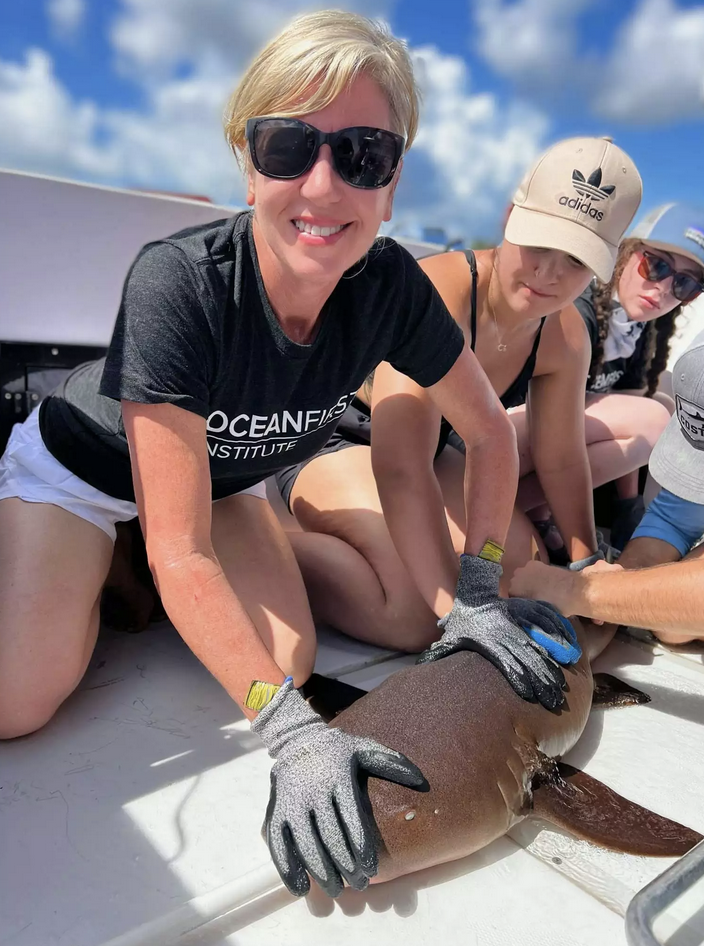-
From the Deep: New Frontiers in Shark Research

6:30 p.m., Thursday, Jan. 8, 2026
Academy University Hill, 833 10th Street, Boulder
Presented by Mikki McComb-Kobza, Ph.D.
CEO & Chief Scientist, Ocean First Institute
Explorers Club Fellow
Past President American Elasmobranch Society
Women Divers Hall of Fame
Assistant Professor Adjunct CU Boulder Ecology & Evolutionary BiologyMost of us have an irrational fear of sharks when in reality, more people die each year from falling vending machines than from shark bites, so desperate as they are to shake loose that final bag of Cheetos.
Learn more amazing facts about shark conservation and the cutting edge of shark science from one of the country’s leading shark researchers. Mikki McComb-Kobza, fresh off a TEDxBoulder presentation this fall, will share stories and findings from Ocean First Institute’s (OFI) latest projects in Florida, including pioneering eDNA research, shark abundance and distribution studies in the Florida Keys using BRUVs and drone surveys, and a new initiative tracking the movements of critically endangered hammerhead sharks with satellite tags.
She will also highlight her ongoing collaborative efforts to uncover the potential connection between mother hammerheads at Cocos Island and nursery grounds in Golfo Dulce, Costa Rica. Her collaborative work helped inspire the world’s first hammerhead shark sanctuary, and the discoveries continue to unfold. It’s a powerful story of science, exploration, and hope for the ocean’s most misunderstood species.
Dr. Mikki McComb-Kobza’s research focuses on the sensory biology and ecological physiology of sharks, skates and rays. Mikki, a dedicated marine biologist for two decades, has been a tireless advocate for sharks, highlighting their global declines and framing new directions for their conservation.
Mikki has been invited to speak, educate and conduct research at labs and institutions in South America, Africa, Asia and Australia. Her outreach efforts have been documented in film, magazine and radio by the BBC, National Geographic, Discovery Channel’s Shark Week, and CBC National Radio Canada. Her current position as CEO & Chief Scientist of Ocean First Institute, based in Boulder, allows her to promote research, conservation, and sustainability.
The Institute supports expeditions and a variety of education initiatives that engage students and public alike. Mikki holds a Ph.D. in Integrative Biology from Florida Atlantic University and is the author of numerous scientific publications.
Learn more at: oceanfirstinstitute.org
-
Annals of a Bee-Seeking Wayfinder

Presented by Dr. Samuel Ramsey, Assistant Professor
Marvin H. Caruthers Endowed Chair for Early-Career Faculty
University of Colorado Boulder BioFrontiers InstituteThursday, Nov. 20, 2025, Boulder, Colorado
Southeast Asia is the only region of the world where every honey bee species is present. With that unparalleled biodiversity comes quite a few parasites, diseases, and specialized predators from “Murder Hornets” to Parasitic Mite Syndrome. Dr. Ramsey’s goal of understanding this disease reservoir dynamic has taken him all over Asia on adventure after adventure.
Dr. Ramsey received his B.S. in entomology from Cornell University and his Ph.D. in entomology from the University of Maryland College Park. He completed his post-doctoral training with Dr. Jay Evans, Steve Cook, and Daniel Sonenshine at USDA-ARS Bee Research Laboratory and now serves as Endowed Professor of Entomology at CU Boulder’s BioFrontiers Institute and the Ecology and Evolutionary Biology Department.Featured on Hulu’s Your Attention Please, as well as in the Washington Post, on NPR, CNN, Wired, CBS This Morning, Khan Academy, Seeker, The Today Showand several local news segments, Ramsey is celebrated as an engaging science communicator. He uses this talent to make science more accessible to a broad audience.
His nonprofit, The Ramsey Research Foundation, works to remove barriers that slow the progress of and decrease access to science by developing novel pathways for scientific funding and by removing paywalls that keep the public from engaging with published scientific work.
For more information: https://www.ramseyresearchfoundation.org

